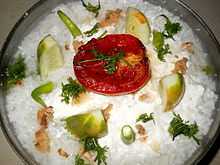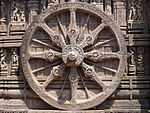Cuisine of Odisha
| Part of a series on the |
| Culture of Odisha |
|---|
| History |
| Culture |
|
| Odisha portal |
 |
| This article is part of the series |
| Indian cuisine |
|---|
|
Regional cuisines
|
|
Ingredients / types of food
|
|
See also
|
|
Related cuisines |
|
Compared to other regional Indian cuisines, Oriya cuisine used relatively less oil and is less spicy but of great taste.[1][2] Rice is the staple food of this region. Mustard oil is used in several dishes as the cooking medium, but ghee is preferred in temples.[2] Food is traditionally served on disposable plates made of sal leaves.[3] Only about 5% of the population is vegetarian.[4]
Oriya cooks, particular from the Puri region, were much sought after due to their ability to cook food in accordance to the Hindu scriptures. During the 19th century, many Oriya cooks were employed in Bengal and they took several dishes with them.[4] Yoghurt is also used in various dishes. Many sweets of the region are based on Chhena (cheese).[5] The period saw a heavy demand of the Brahmin cooks, leading many Oriya cooks to fake their castes.[6]
Ingredients and seasoning
The ingredients used in Oriya cuisine typical to the region are plantains, jackfruit, and papaya. The curries are also garnished with dried raw mango (ambula) and tamarind. Coconut is also used in several dishes.[7] Panch phutana is a blend of five spices which is widely used in Oriya cuisine. It contains mustard, cumin, fenugreek, aniseed and kalonji. Garlic and onion are also used, but is avoided in temple regions. Turmeric and red chillies are also commonly used.[2]
Local variation
The food in the region around Puri-Cuttack is greatly influenced by the Jagannath Temple. On the other hand, kalonji and mustard paste is used mostly in the region bordering Bengal and curries tend to be sweeter. In the region closer to Andhra Pradesh, curry tree leaves and tamarind are used more.[2] The Brahmapur region has influences of South Indian cuisine and the Telugu people living there have also invented new Oriya dishes.[8]
Temple food
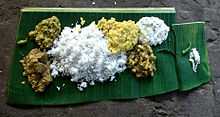
Various temples in region make their own offerings to the presiding deities. The prasada of the Jagannath Temple is well known and is specifically called "MAHA PRASADA" meaning greatest of all prasadas. It consists of 56 recipes, so it called chhapan bhoga. It is based on the legend that Krishna missed his 8 meals for 7 days while trying to save a village from a storm holding up the Govardhan hill as a shelter.[5]
Fish and sea food
Fish and other sea foods are eaten in mainly coastal areas. Several curries are prepared from prawn and lobster with spices.[2][9] Freshwater fish is also available from rivers and irrigation canals.[4]
List of dishes
Rice dishes and rotis
- Pakhala: It is a rice dish made by adding water to cooked rice. It may then be allowed to ferment overnight, this is called basi pakhala. The unfermented version is called saja pakhala. It is served with green chillies, onions, yoghurt, badi etc. It is primarily eaten in summer.[10][11]
- Khechadi: A rice dish cooked with lentils.[12][13] It is the Oriya version of khichdi.[14]
- Palau: A rice dish made from vegetables and raisins. It is the Oriya version of pilaf.[15][16]
- Kanika: A sweet rice dish, garnished with raisins and nuts.[11][17]
- Ghee Rice: A rice dish, fried with ghee and cinnamon
Dals and curries
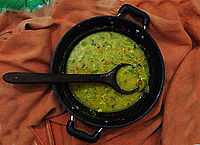
- Dalma: A dish made from dal and vegetables.[18] It is generally made from toor dal and contains chopped vegetables like green papaya, unripe banana, eggplant, pumpkin, gourd etc. It is garnished with turmeric, mustard seeds, and panch phutana. There are several variations of this dish.[4]
- Santula: A dish finely chopped vegetables which are sauteed with garlic, green chillies, mustard and various spices. It has several variations.[4][11]
- Chaatu Rai: A dish made from mushrooms and mustard.[18]
- Kadali Manja Rai: A curry made from banana plant stem and mustard seeds. Manja refers to the stem which can also be used in dalma.[11][19][20]
Khattas and chutneys
Khatta refers to a type of sour side dish or chutney usually served with Oriya thalis.[21]
- Dahi Baigana: A sour dish made from dahi and egg plants.[11][15]
- Khajuri Khatta: A sweet and sour dish made from tomato and dates.[11][22][23]
- Amba Khatta: A khatta made from raw mangoes.[24]
- Ouu Khatta: Elephant apple khatta[4]
- Dhania-Patra Chutney: A chutney made from coriander leaves.[25]
Saaga (salad greens)
Oriyas typically eat loads of cooked green leaves of various types. They are prepared by adding "pancha phutana", with or without onion/garlic and are best enjoyed with pakhala. One of the most popular saaga is Lali Koshala Saaga- which have green leaves with red stems. Other saagas that are eaten are pita gahama, khada, poi, koshala, sajana etc.
Pithas (country cakes)

Pithas are a type of traditional Oriya dishes.[26][27]
- Poda pitha[26]
- Enduri pitha
- Chitau pitha
- Arisa pitha
- Kakara pitha
- Manda pitha
- Parijata pitha
- Nurukhurum pitha
Fish and other sea food

- Maccha Besara: A fish curry prepared with mustard paste.[11][28]
- Machha Mahura: A curry prepared with fish and various vegetables.[11][29]
- Machha charchari: Small fried fishes[12]
- Machha besara: Freshwater fish cooked with spices.[12]
- Chungdi malai tarkari: A prawn curry.[12]
- Kankada jhola: Crab curry.[12]
- Machha chhencheda[11]
- Chingudi Chadchadi
- Chhinchada
Chicken and chevon
Fritters and fries
Snacks
Desserts and sweets
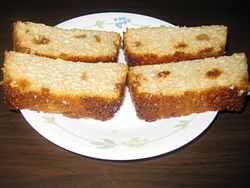
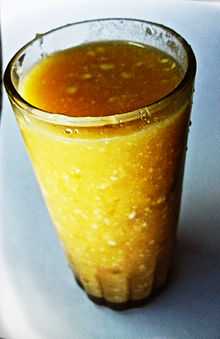
- Kheeri: Kheeri is the Oriya word for kheer.[13][33]
- Chhena Poda: A sweet made from soft cheese dipped in sugar syrup and baked. It may also contain dry fruits.[2]
- Chhena Gaja[24]
- Malpua[30]
- Kora[4]
- Kheera sagara[30]
- Chhenna jilabi[12]
- Chhena Jhili[21]
- Rasagolla: The sweet was invented in the city of Puri to appease the deity Mahalaxmi about 300 years. However, the Bengali people claim that it was invented in the nineteenth century by a Calcutta sweetmaker.[4][34]
- Gulab jamun[5][34]
- Rasabali[12][21]
- Rasamalai[34]
- Aadasi
References
- ↑ "The coastal edge". The Telegraph (India). 27 March 2010. Retrieved 11 September 2014.
- ↑ 2.0 2.1 2.2 2.3 2.4 2.5 "From the land of Jagannath". The Hindu. 28 July 2004. Retrieved 11 September 2014.
- ↑ "Not a stereotyped holiday". The Hindu. 10 March 2002. Retrieved 11 September 2014.
- ↑ 4.0 4.1 4.2 4.3 4.4 4.5 4.6 4.7 Charmaine O' Brien (15 December 2013). "Orissa". The Penguin Food Guide to India. Penguin Books Limited. p. 188. ISBN 978-93-5118-575-8. Retrieved 9 December 2014.
- ↑ 5.0 5.1 5.2 Rocky Singh; Mayur Sharma (25 July 2014). Highway on my Plate-II: the indian guide to roadside eating. Random House India. p. 370. ISBN 978-81-8400-642-1.
- ↑ Utsa Ray (30 November 2014). Culinary Culture in Colonial India. Cambridge University Press. p. 126. ISBN 978-1-107-04281-0.
- ↑ Northeast India. Lonely Planet. 2007. p. 86. ISBN 978-1-74179-095-5. Retrieved 9 December 2014.
- ↑ "New cookery show on TV soon". The Hindu. 23 Dec 2010.
- ↑ delhi/article1079468.ece "Inside Delhi". The Hindu. 11 January 2011. Retrieved 11 September 2014.
While savouring Chingudi malai curry (prawns with rich Oriya spices) and kukuda jhola (chicken cooked with spices and egg), the friend soaked in the atmosphere and was transported back to the sight and smell of his native place.
- ↑ "Pakhala, a hot favourite in Orissa`s summer menu". Zee News. 11 April 2010. Retrieved 9 December 2014.
- ↑ 11.0 11.1 11.2 11.3 11.4 11.5 11.6 11.7 11.8 11.9 "Oriya cuisine spices up syllabus". The Telegraph (India). 23 Feb 2011. Retrieved 11 September 2014.
- ↑ 12.0 12.1 12.2 12.3 12.4 12.5 12.6 12.7 12.8 12.9 12.10 "Yummy fare at Odia food fest". The Hindu. 26 Feb 2010. Retrieved 11 September 2014.
- ↑ 13.0 13.1 13.2 "Women vie for kitchen queen title — Contestants cook up mouth-watering dishes at cookery contest". The Telegraph (India). 9 August 2010. Retrieved 11 September 2014.
Oriya dishes like khiri, khichdi, kasha mansa were also prepared by the contestants.
- ↑ "Khechidi". Oriya Kitchen. Retrieved 9 December 2014.
- ↑ 15.0 15.1 "Potpouri" (The Telegraph (India)). 29 July 2011. Retrieved 11 September 2014.
- ↑ "Palau (pulao)". Oriya Kitchen. Retrieved 9 December 2014.
- ↑ "Kanika". Destination Orissa. Retrieved 9 December 2014.
- ↑ 18.0 18.1 "Rahul savours ‘dalma’ and ‘khir’". The Hindu. 14 May 2008. Retrieved 11 September 2014.
- ↑ Bijoylaxmi Hota; Kabita Pattanaik (2007). Healthy Oriya Cuisine. Rupa & Company. p. 29. ISBN 978-81-291-1118-0.
- ↑ "Kadali Manja Rai". eOdisha. Retrieved 9 December 2014.
- ↑ 21.0 21.1 21.2 21.3 "Tasty treat of tangy khatta & spicy tadka". The Telegraph (India). 12 August 2010. Retrieved 11 September 2014.
The Oriya thali consists of tangy khatta and proceeds further with traditional dishes such as the green and healthy spinach item saga badi.
- ↑ "कच्चे आम की रसीली चटनी: अंबा खट्टा". Boldshy (in Hindi). Retrieved 9 December 2014.
- ↑ "Recipe: Tomato-khajuri khatta". The Times of India. 1 October 2012. Retrieved 9 December 2014.
- ↑ 24.0 24.1 24.2 "It’s time to pamper your tastebuds". The Telegraph (India). 16 June 2011. Retrieved 11 September 2014.
- ↑ "Coriander Chutney". FullOdisha. Retrieved 9 December 2014.
- ↑ 26.0 26.1 "Poda pithas take the cake". The Telegraph (India). 16 June 2011. Retrieved 11 September 2014.
- ↑ "Traditional ‘pitha’ undergoes a sea change". The Hindu. 14 April 2008. Retrieved 11 September 2014.
- ↑ "Machha Besara (A spicy dish of Rohu fish)". Five Tastes. Retrieved 9 December 2014.
- ↑ "Machha Mahura (Fish with Mixed Vegetable Curry)". Bewarchi.
- ↑ 30.0 30.1 30.2 30.3 "Good response to Odiya food festival". The Hindu. 2 April 2012. Retrieved 11 September 2014.
- ↑ "Matar Ghugni aur Murmure". Mamta's Kitchen. Retrieved 9 December 2014.
- ↑ "Youths from Bihar and UP rule the ‘golgappa’ market". The Hindu. 13 November 2009. Retrieved 11 September 2014.
- ↑ "A cook-off in the lord’s name". The Telegraph (India). 19 July 2013. Retrieved 11 September 2014.
- ↑ 34.0 34.1 34.2 "Several good reasons to loiter". The Hindu. Retrieved 11 September 2014.
Mouth-watering malpua, rasagulla, rasamalai, gulab jamun and other Oriya sweetmeats are served here.
Further reading
| Wikimedia Commons has media related to Cuisine of Orissa. |
- Bijoylaxmi Hota; Kabita Pattanaik (2007). Healthy Oriya Cuisine. Rupa & Company. ISBN 978-81-291-1118-0.
- Sujata Patnaik; Ranjita Patnaik. Classic Cooking of Orissa. Allied Publishers. ISBN 978-81-8424-584-4.
- Laxmi Parida (1 April 2003). Purba: Feasts from the East: Oriya Cuisine from Eastern India. iUniverse. ISBN 978-0-595-26749-1.
| ||||||||||||||||||||||||||||||
